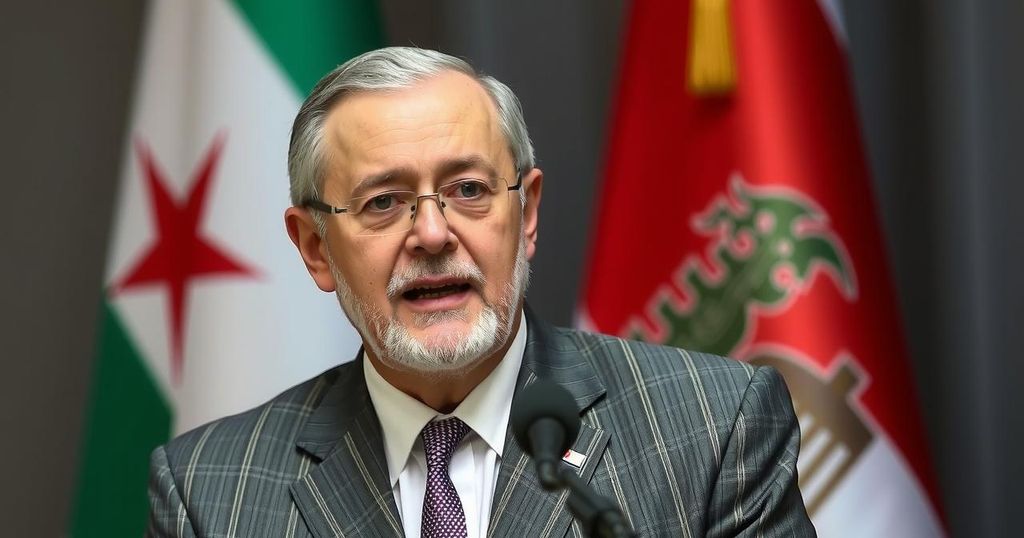Syria’s New Leader Commits to Respect Lebanon’s Sovereignty After Power Transition
Syria’s new leader, Ahmed al-Sharaa, has pledged not to negatively interfere in Lebanon, emphasizing respect for its sovereignty. His comments follow meetings with regional leaders, including Turkish officials and Lebanese Druze chiefs, aimed at fostering supportive alliances post-Assad’s regime. This diplomatic stance marks a departure from Syria’s historically contentious involvement in Lebanon’s political landscape and addresses the need for stability in the region.
In a significant diplomatic gesture, Ahmed al-Sharaa, the new leader of Syria, has reiterated his commitment to refrain from any adverse interference in Lebanon’s affairs. Following a swift takeover of power, Sharaa engaged in regional dialogues, notably affirming this position in a meeting with Lebanese Druze leaders. He emphasized Syria’s respect for Lebanon’s sovereignty and pledged to maintain an impartial stance towards all factions within the country.
Sharaa’s commitments come alongside strengthened ties with Turkey and Saudi Arabia, both of which are eager to engage with Syria’s new governance following the ousting of Bashar al-Assad. Turkey, which has historically supported the Islamist group Hayat Tahrir al-Sham (HTS), showcased its supportive role by engaging in high-level discussions shortly after the regime’s collapse.
The new Syrian administration acknowledges the historical grievances from Lebanon, where Syria’s presence has often been viewed with anxiety and fear. Sharaa’s promise to stand at an equal distance from all groups is a vital step towards fostering stability in Lebanese-Syrian relations. On the other hand, while HTS has garnered international concern due to its classification as a terrorist organization, it has sought to moderate its public image amidst evolving geopolitical dynamics.
Internationally, powers such as the United States and the European Union are cautiously optimistic, emphasizing the urgent need for protections for women and minorities in the new Syrian regime. Iran’s supreme leader expressed confidence in the Syrian populace’s resilience, suggesting that the situation could lead to a united front against instability.
The historical context surrounding Syria’s interactions with Lebanon, including past military involvement and fatal political intrigues, remains pivotal in understanding the current landscape as Sharaa assumes control and articulates his vision for future bilateral relations.
The article discusses the recent shift in leadership in Syria following the fall of Bashar al-Assad, marking a crucial transition in both Syrian and regional politics. Ahmed al-Sharaa’s ascent signifies a change in the approach towards Lebanon, particularly concerning the historical patterns of Syrian intervention. It sheds light on the significance of maintaining Lebanon’s sovereignty post-Assad, while also detailing the implications of Sharaa’s dialogues with key regional players, notably Turkey and Saudi Arabia, who share vested interests in Syria’s stability. The context of Hezbollah’s influence and the broader geopolitical ramifications, including Iran’s role, underlines the complexity of these relationships.
In conclusion, Ahmed al-Sharaa’s assurance to avoid negative involvement in Lebanon represents a pivotal shift in Syrian foreign policy aimed at stabilizing relations with its neighbor. This commitment, coupled with active diplomacy from Turkey and Saudi Arabia, highlights the international community’s focus on a peaceful transition in Syria post-Assad. The concerns surrounding the new Sunni administration’s potential consequences and the historical context of Syrian-Lebanese relations will continue to shape regional dynamics moving forward.
Original Source: www.hindustantimes.com




Post Comment